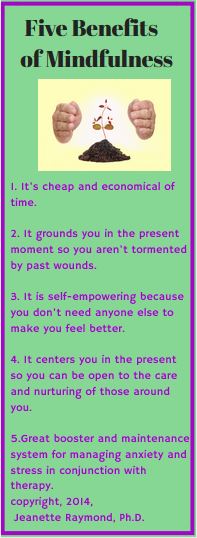Anger and Stress Management Tips for Satisfying Relationships by Dr. Jeanette Raymond, Ph.D.
Mindfulness is a hot topic in the area of anger and stress managment. But do you know what it is?
Have you got any idea of what it entails and how it can aid you in dealing with your anger and stress?
Let’s start with what Mindfulness is not!
Mindfulness is not meditation.
Mindfulness is not digging into yourself and discovering your unconscious wishes.
Mindfulness is not getting rid of all your thoughts and feelings
Mindfulness is not about detachment from the people and world around you
Mindfulness is not an escape from bad feelings like hurt, pain, anger, fear or envy.
Now let’s look at what mindfulness is and how it can be of use to you.
1. In his book ‘The Mindful Brain’, Daniel Siegel describes mindulfulness as being aware of your mind and it’s processes, so that you are not operating on auto pilot.
2. Mindful awarness involves reflection of what you are thinking, doing and feeling so that you are conscious of the choices you are making, and can opt for different ones to better your moment to moment, day to day life.
Benefit: when you feel irritated and angry you can sense it in your body, as you tune into your muscle tension, teeth clenching and sighing. You can then formulate words to describe your anger, and then share it in the moment. Putting your emotional experience into words, dampens the intensity of the feelings, and helps you stay and feel in control. Others experience you as genuine, adapting the converstion accordingly. You don’t store anger and it doesn’t build up into stress that makes you sick.
3. Reflecting on your mind and what it is thinking and doing gives you the opportunity to empower yourself, instead of just being reactive and blaming everyone and everything around you for your actions.
Benefit:you are in full control of your reactions and responses. You can choose to interpret other peoples motives in a more benign way, instead of letting your autopilot take you to the same old place of rejection and hurt. You don’t feel helpless and you avoid the shame and guilt of being ‘reactive.’
4. Tuning into your mental proceses puts you in the here-and-now, so that you fully participate in and experience the person you are with, the surroundings you are in and the needs you have at that time.
Benefit: staying in the present releases you from captivity. Your past negative experiences predispose you to be over cautious and dismiss anything that looks or feels good as sinister, suspicious or a fluke. Mindful awareness focuses you on the reality in front of you so that you see and create a more positive life experience.
5. Embedding yourself in the here-and-now allows you to meet your need for connection with someone else, or to be apart and take care of hurt, pain or fear. Feeling your emotions as they arise means you take care of yourself in a natural organic manner. You don’t brush it off and let it build up into intense anger or resentment.
Benefit: you never get hijacked by your frustration, anger or pessimism. You tolerate the bad feelings with the good and give both equal space. You have more of you to use as a resource because you are not trying to suppress feelings that you don’t approve of. That’s how you build self-compassion and compassion for others.
6. You don’t hide from yourself, so you come across as authentic from the inside out. The image you show to others matches what you feel inside, making relating easy, and fun.
Benefit: you are at peace with yourself, non-judgmental and accepting. You have more space to be curious about others and invite them to be with you rather than perform certain functions for you. Relating becomes more meaningul and satisfying.
7. Reflecting in a mindful way about what you actually want or are conflicted about builds self-compassion and patience for your process. It reduces the judge inside you that wants you to be perfect.
Benefit:flexibility of spirit means you can adapt to the situations around you without getting into a panic or fearing bad outcomes. Being in step with the world around you makes life easier than if you were fighting it to suit what you think it should be.
8. Mindfulness is cheap in terms of financial outlay and you don’t need to depend on others to do it. But you do need to see it as a way of being, not just a 15 minute mental exercise as if you were going to the gym or jogging. It has to become like a skin that you wear and adapt to depending on your emotional state.
Benefit:being a mindfully aware person means you can start to read others more accurately. You get to understand the dynamics of the relationships you are in and most of all, you develop the fortitude to enjoy emotional intimacy instead of fearing it.
copyright, Jeanette Raymond, Ph.D.
You might also like:
Four ways to turn anger into love
How to get your partner to listen to your side of things without tuning out
How to deal with panic when anger managment doesn’t work
Disclaimer: this article is for informational and educative purposes only. Dr. Raymond is not responsible for any reactions you may have when reading the content or using the suggestions therein. Interacting with this material does not constitute a therapeutic relationship with Dr. Jeanette Raymond





